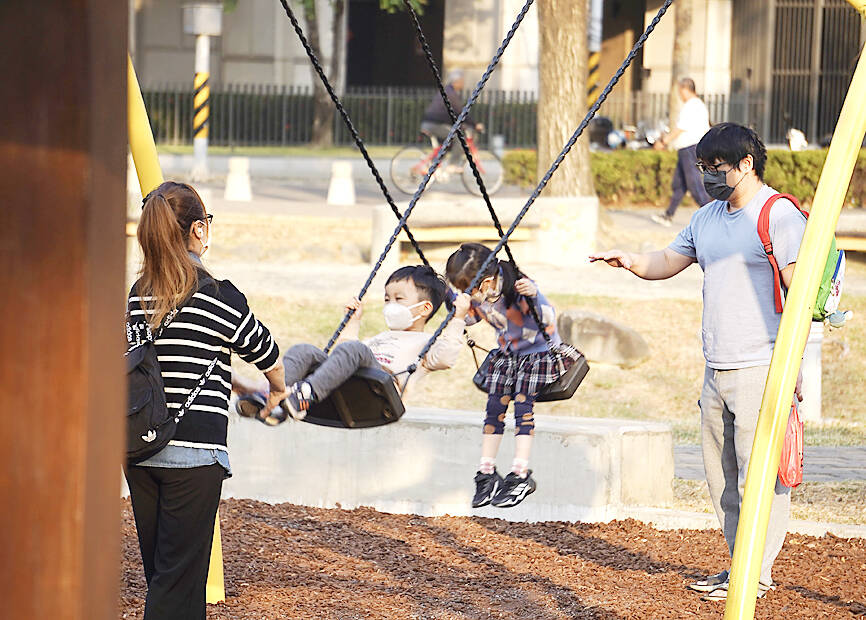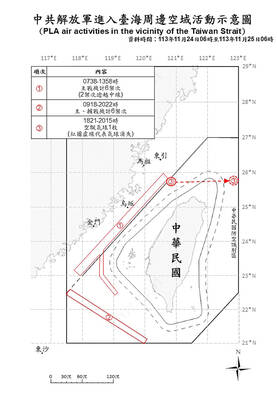Taiwan is to launch a pilot program for flexible parental leave later this year at the earliest, the Ministry of Labor said on Wednesday.
The ministry is developing a “small-scale trial” for flexible natal leave that businesses and government offices can join voluntarily, Department of Labor Standards and Equal Employment Director Huang Wei-chen (黃維琛) said.
The program would be conducted in accordance with regulations, which entitle workers with children under the age of three to accumulate up to two years of unpaid parental leave without losing their jobs, Huang said.

Photo: CNA
Additionally, workers are entitled to a child-rearing subsidy over six months, she said.
People employed in private enterprises and government agencies that take part in the program would be able to take leave in blocks of five to seven days from their two-year quota, instead of being required to use at least one month at a time, she said.
The ministry is in discussions with agencies on policy details, including the appropriate procedures for giving out the child-rearing subsidy, Huang said.
The idea of flexible parental leave faces significant resistance from Taiwanese enterprises due to concerns over potential complications in human resource management, she said.
The trial program would test that objection by including people employed in professions that do not follow the regular work week of Monday to Friday, she said, adding that information collected from the test would be valuable for policymaking.
Government offices and private enterprises that take part in the experiment can drop out should they experience significant operational difficulties as a result of allowing flexible parental leave, she said.
The trial program would probably run for six months, Huang added.

Taiwan’s passport ranked 34th in the world, with access to 141 visa-free destinations, according to the latest update to the Henley Passport Index released today. The index put together by Henley & Partners ranks 199 passports globally based on the number of destinations holders can access without a visa out of 227, and is updated monthly. The 141 visa-free destinations for Taiwanese passport holders are a slight decrease from last year, when holders had access to 145 destinations. Botswana and Columbia are among the countries that have recently ended visa-free status for Taiwanese after “bowing to pressure from the Chinese government,” the Ministry

Theaters and institutions in Taiwan have received 28 threatening e-mails, including bomb threats, since a documentary critical of China began being screened across the nation last month, the National Security Bureau said yesterday. The actions are part of China’s attempts to undermine Taiwan’s sovereignty, it said. State Organs (國有器官) documents allegations that Chinese government officials engage in organ harvesting and other illegal activities. From last month to Friday last week, 28 incidents have been reported of theaters or institutions receiving threats, including bomb and shooting threats, if they did not stop showing the documentary, the bureau said. Although the threats were not carried out,

HEALTHCARE: Following a 2022 Constitutional Court ruling, Taiwanese traveling overseas for six months would no longer be able to suspend their insurance Measures allowing people to suspend National Health Insurance (NHI) services if they plan to leave the country for six months would be abolished starting Dec. 23, NHIA Director-General Shih Chung-liang (石崇良) said yesterday. The decision followed the Constitutional Court’s ruling in 2022 that the regulation was unconstitutional and that it would invalidate the regulation automatically unless the NHIA amended it to conform with the Constitution. The agency would amend the regulations to remove the articles and sections that allow the suspension of NHI services, and also introduce provisional clauses for those who suspended their NHI services before Dec. 23, Shih said. According to

‘GRAY ZONE’ TACTICS: China continues to build up its military capacity while regularly deploying jets and warships around Taiwan, with the latest balloon spotted on Sunday The US is drawing up contingency plans for military deployments in Japan and the Philippines in case of a Taiwan emergency, Japan’s Kyodo news agency reported. They would be incorporated in a first joint operation plan to be formulated in December, Kyodo reported late on Sunday, citing sources familiar with Japan-US relations. A US Marine Corps regiment that possesses High Mobility Artillery Rocket Systems — a light multiple rocket launcher — would be deployed along the Nansei Island chain stretching from Kyushu to Yonaguni near Taiwan, Kyodo said. According to US military guidelines for dispatching marines in small formations to several locations,